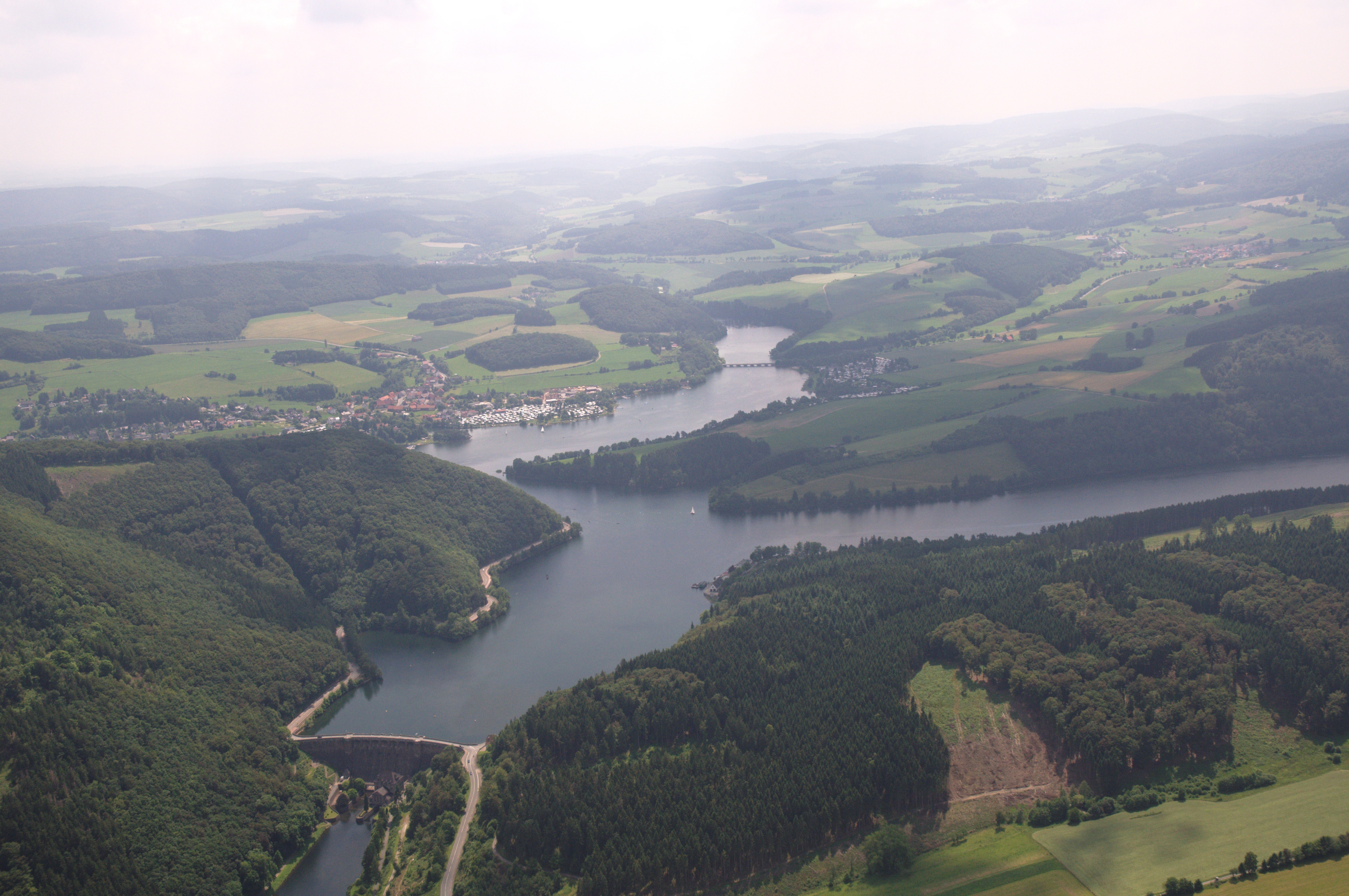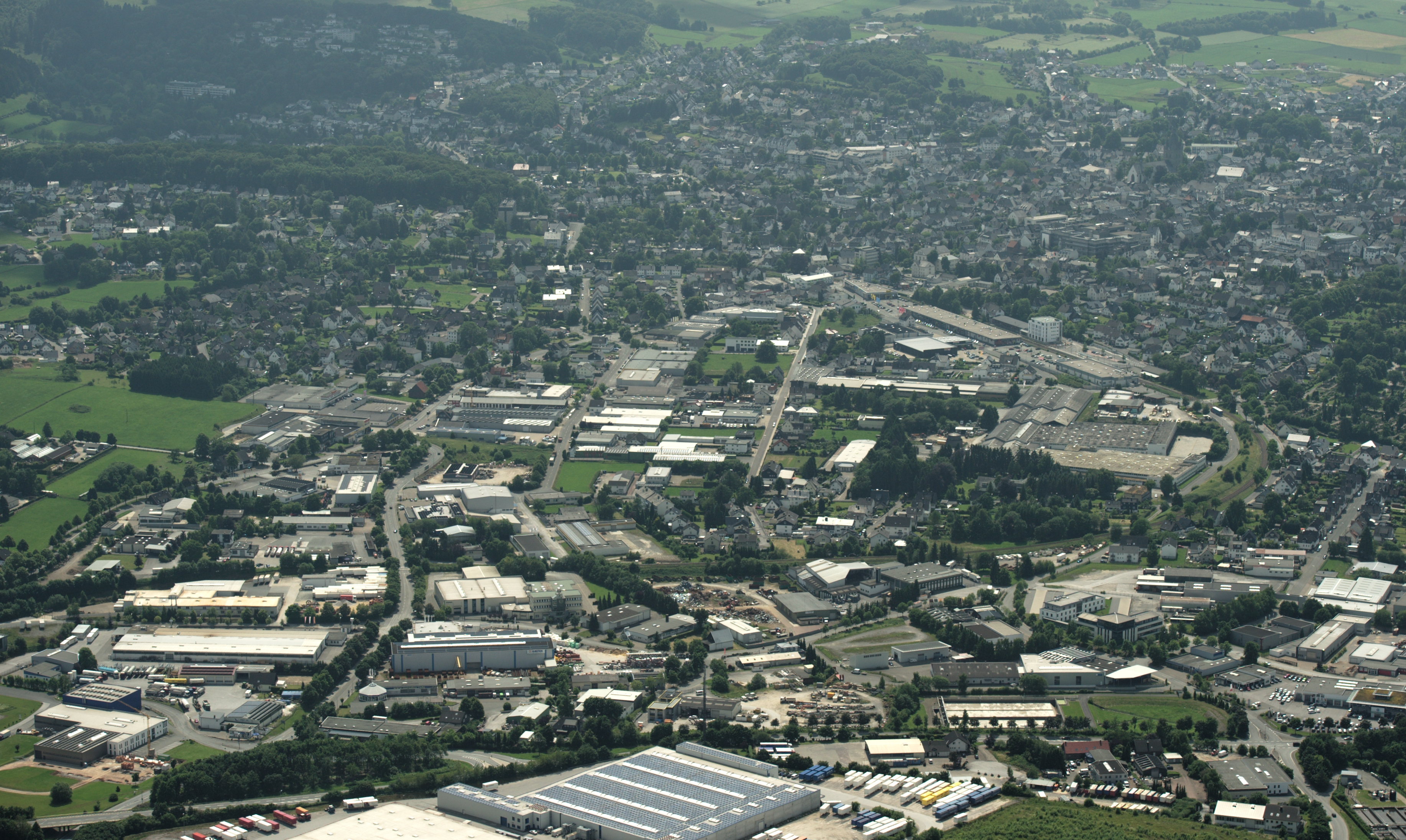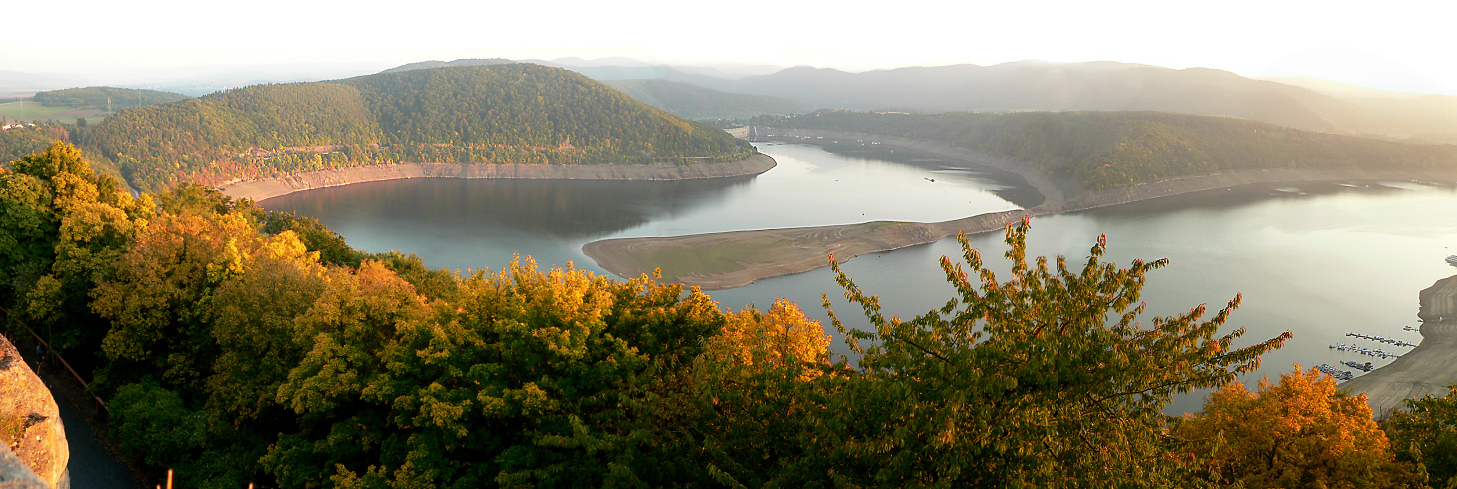|
Heringhausen (Diemelsee)
Heringhausen in the area of Waldeck, Upland and Sauerland, is a village in the municipality Diemelsee in northern Hesse. Heringhausen is a recognized health resort. Etymology Several variants are known concerning the origin of the place name Heringhausen. Originally the name consisted of a composition of -inghūsen and the personal name Hard(i)/Hardo, which is attributed to the word stem "Hardu" (too German old-language hard ' strong, strong, bold'). In the literature, interpretations are given to it: "at the houses of the people of Hard(i)/Hardo". Later Latin or Middle High German documents for the monastery Kaufungen the place names Hardinghuson (1023), Herdinchußen, Herdynckhusen and Hertighusin are documented as earlier place names. In further documents appears "Heriwardeshuson" (1043). Geography Heringhausen is located between Dortmund and Kassel south of Paderborn, approximately in the middle of a triangle with the verticepoints of Korbach, Brilon and Marsberg ... [...More Info...] [...Related Items...] OR: [Wikipedia] [Google] [Baidu] |
Diemelsee (municipality)
Diemelsee is a municipality in Waldeck-Frankenberg in northwest Hesse, Germany, and is part of the low mountain region called Upland (region), Upland. Adorf (Diemelsee), Adorf is the seat of this municipality. Geography Location Diemelsee lies on the river Diemel in the Diemelsee Nature Park just upstream from and southwest of the Diemelsee reservoir (water), reservoir. The town of Korbach is found about 10 km to the southeast, and the town of Paderborn 39 km to the north. Neighbouring communities Diemelsee borders in the north on the town of Marsberg (Hochsauerlandkreis in North Rhine-Westphalia), in the northeast on the town of Bad Arolsen, in the east on the community of Twistetal, in the south on the town of Korbach, in the southwest on the community of Willingen (all in Waldeck-Frankenberg), and in the west on the town of Brilon (Hochsauerlandkreis). Constituent communities The community of Diemelsee came into being as part of municipal reform in 1971 through the v ... [...More Info...] [...Related Items...] OR: [Wikipedia] [Google] [Baidu] |
Paderborn
Paderborn (; Westphalian: ''Patterbuorn'', also ''Paterboärn'') is a city in eastern North Rhine-Westphalia, Germany, capital of the Paderborn district. The name of the city derives from the river Pader and ''Born'', an old German term for the source of a river. The river Pader originates in more than 200 springs near Paderborn Cathedral, where St. Liborius is buried. Paderborn ranks 55th on the List of cities in Germany by population. History Paderborn was founded as a bishopric by Charlemagne in 795, although its official history began in 777 when Charlemagne built a castle near the Pader springs.Ed. Heribert Zelder, Tourist Information Services, ''Welcome to Paderborn'', Stadt Paderborn: Paderborn, Germany, 2009. In 799 Pope Leo III fled his enemies in Rome and reached Paderborn, where he met Charlemagne, and stayed there for three months. It was during this time that it was decided that Charlemagne would be crowned emperor. Charlemagne reinstated Leo in Rome in 800 ... [...More Info...] [...Related Items...] OR: [Wikipedia] [Google] [Baidu] |
Thomas Klein (Historiker)
Thomas Klein (born April 14, 1948) is a German civil rights activist, historian, and politician. Life Klein was born in Berlin on April 14, 1948. He trained as an electrical mechanic before enrolling at Humboldt University to study mathematics, where he received his doctorate in 1976. Meanwhile, Klein had begun working at the Central Institute for Economic Sciences, part of the Academy of Sciences of the GDR, in 1973. During the 1970s, Klein began to associate with opposition groups in the German Democratic Republic. As a result, he was arrested by the Stasi in September 1979, and taken to Berlin-Hohenschönhausen Prison. Klein was convicted of "unlawful contact" ("ungesetzlicher Verbindungsaufnahme") under section 219 of the East German criminal code. During his trial, Gregor Gysi served as his lawyer. He was held in the Bautzen II prison until his release in December 1980. Following his release, Klein was banned from working in the sciences, and was assigned to work at a s ... [...More Info...] [...Related Items...] OR: [Wikipedia] [Google] [Baidu] |
Johann Friedrich Böhmer
Johann Friedrich Böhmer (22 April 179522 October 1863) was a German historian. His historical work was chiefly concerned with collecting and tabulating charters and other imperial documents of the Middle Ages. This work in turn cites: * Johannes Janssen, ''J. F. Böhmers Leben, Briefe und kleinere Schriften'' (Freiburg, 1868). Biography Böhmer was born in Frankfurt as the son of the Palatine official Karl Ludwig Böhmer. Educated at the universities of Heidelberg and Göttingen, he showed an interest in art and visited Italy; but returning to Frankfurt he turned his attention to the study of history, and became secretary of the ''Gesellschaft für ältere deutsche Geschichtskunde''. He was also archivist and then librarian of the city of Frankfurt. Böhmer had a great dislike of Prussia and the Protestant faith, and a corresponding affection for Austria and the Roman Catholic Church, to which, however, he did not belong. His critical sense was, perhaps, somewhat warped; but hi ... [...More Info...] [...Related Items...] OR: [Wikipedia] [Google] [Baidu] |
Willingen
Willingen (official name: ''Willingen (Upland)'') is a municipality in Waldeck-Frankenberg in northern Hesse, Germany, some 80 km west of Kassel. Geography Location Willingen is found in Waldeck-Frankenberg district in the Upland. Its main town stretches between two river valleys, the Hoppecke in the west and the Itter in the east. The ski resort Skigebiet Willingen is near. It is located 60 km west of Kassel. Mühlenkopfschanze ski jump is also located here. Neighbouring communities Willingen borders in the north on the community of Diemelsee, in the east on the town of Korbach, in the south on the community of Medebach, and in the west on the towns of Winterberg, Olsberg and Brilon (all three in the Hochsauerlandkreis in North Rhine-Westphalia). Constituent communities Willingen consists of the following centres: * Bömighausen, 300 inhabitants (as of 1 September 2003) * Eimelrod, 582 inhabitants (as of 31. December 2006) * Hemmighausen, 100 inhabitants * Neer ... [...More Info...] [...Related Items...] OR: [Wikipedia] [Google] [Baidu] |
Marsberg
Marsberg () is a town in the Hochsauerland district, in North Rhine-Westphalia, Germany. History Although its origins are obscure, Marsberg was a prospering town by the 13th century (it was even minting coins). It was a free city until 1807, when it was incorporated into the Kingdom of Westphalia, until 1813. After two years of independent government, it was added to Prussia in 1815. Geography It is situated on the river Diemel, approx. 20 km east of Brilon and 30 km south of Paderborn. Neighbouring municipalities * Bad Arolsen * Bad Wünnenberg * Brilon * Diemelsee * Diemelstadt * Lichtenau * Warburg Town division Marsberg consists of the following 17 districts: * Beringhausen * Borntosten * Bredelar * Canstein * Erlinghausen * Essentho * Giershagen * Heddinghausen * Helminghausen * Leitmar * Meerhof * Niedermarsberg * Obermarsberg * Oesdorf * Padberg * Udorf * Westheim International relations Marsberg is twinned with: * Lillers (France) Notable people ... [...More Info...] [...Related Items...] OR: [Wikipedia] [Google] [Baidu] |
Brilon
Brilon (; Westphalian: ''Brailen'') is a town in North Rhine-Westphalia, central Germany, that belongs to the Hochsauerlandkreis. Geography Brilon is situated on the Brilon Heights at an altitude of about 450 m on the upper reaches of the river Möhne. The town lies between the Arnsberg Forest nature reserve to the west and the Lake Diemel nature reserve and the Hoppecke to the south-east. Neighboring municipalities Division of the town After the local government reforms of 1975 Brilon consists of 17 districts: * Alme (1.273 inhabitants) * Altenbüren (1.453 inhabitants) * Bontkirchen (553 inhabitants) * Brilon Town (14.513 inhabitants) * Brilon-Wald (595 inhabitants) * Esshoff (80 inhabitants) * Gudenhagen/Petersborn (1.273 inhabitants) * Hoppecke (1.330 inhabitants) * Madfeld (1.395 inhabitants) * Messinghausen (898 inhabitants) * Nehden (503 inhabitants) * Radlinghausen (129 inhabitants) * Rixen (143 inhabitants) * Rösenbeck (858 inhabitants) * Scharfenberg (1.533 ... [...More Info...] [...Related Items...] OR: [Wikipedia] [Google] [Baidu] |
Korbach
Korbach (pronunciation: ˈkoːɐˌbax), officially the Hanseatic City of Korbach (German language, German: Hansestadt Korbach), is the district seat of Waldeck-Frankenberg in northern Hesse, Germany. It is over a thousand years old and is located on the German Timber-Frame Road. In 2018, the town has hosted the 58th Hessentag state festival. Geography and geology Korbach lies at the north-east edge of the Rhenish Slate Mountains (here known as the ''Waldeck'sches Upland'', the second word being a German language, German proper name, not the English word "upland"). Neighbouring towns and communities are, clockwise from the northwest, Willingen, Diemelsee, Twistetal, Waldeck, Hesse, Waldeck, Vöhl, Lichtenfels, Hesse, Lichtenfels (likewise all in Waldeck-Frankenberg) and Medebach (Hochsauerlandkreis in North Rhine-Westphalia). The town lies on an unwooded tableland called the Waldecker Tafel that once harboured a great many wild chickens, leading to the townsfolk's nickname as ''"F ... [...More Info...] [...Related Items...] OR: [Wikipedia] [Google] [Baidu] |
Kassel
Kassel (; in Germany, spelled Cassel until 1926) is a city on the Fulda River in northern Hesse, Germany. It is the administrative seat of the Regierungsbezirk Kassel and the district of the same name and had 201,048 inhabitants in December 2020. The former capital of the state of Hesse-Kassel has many palaces and parks, including the Bergpark Wilhelmshöhe, which is a UNESCO World Heritage Site. Kassel is also known for the '' documenta'' exhibitions of contemporary art. Kassel has a public university with 25,000 students (2018) and a multicultural population (39% of the citizens in 2017 had a migration background). History Kassel was first mentioned in 913 AD, as the place where two deeds were signed by King Conrad I. The place was called ''Chasella'' or ''Chassalla'' and was a fortification at a bridge crossing the Fulda river. There are several yet unproven assumptions of the name's origin. It could be derived from the ancient ''Castellum Cattorum'', a castle of the ... [...More Info...] [...Related Items...] OR: [Wikipedia] [Google] [Baidu] |
Waldeck-Frankenberg
Waldeck-Frankenberg is a ''Kreis'' (district) in the north of Hesse, Germany. Neighbouring districts are Höxter, Kassel, Schwalm-Eder, Marburg-Biedenkopf, Siegen-Wittgenstein, Hochsauerland. History The district was created in 1972 by merging the two districts of Frankenberg and Waldeck. Most of the area of the district was previously part of the ''Freistaat Waldeck'', the successor of the principality of Waldeck. Geography The district is located in the mountains of the Sauerland, with the highest elevation in the district of . With , it's the largest district in Hessen. Four artificial lakes created by dams are in the district, the biggest is the Edersee, which covers an area of . The Eder is also the main river in the district; the Diemel in the north is a smaller river. Mountains * Sähre Coat of arms ;Blason :''“Per bend sinister Azure a lion rampant issuant per fess Argent and Gules and Or a star with eight rays Sable.”'' The coat of arms shows the lion of Hesse i ... [...More Info...] [...Related Items...] OR: [Wikipedia] [Google] [Baidu] |
Dortmund
Dortmund (; Westphalian nds, Düörpm ; la, Tremonia) is the third-largest city in North Rhine-Westphalia after Cologne and Düsseldorf, and the eighth-largest city of Germany, with a population of 588,250 inhabitants as of 2021. It is the largest city (by area and population) of the Ruhr, Germany's largest urban area with some 5.1 million inhabitants, as well as the largest city of Westphalia. On the Emscher and Ruhr rivers (tributaries of the Rhine), it lies in the Rhine-Ruhr Metropolitan Region and is considered the administrative, commercial, and cultural center of the eastern Ruhr. Dortmund is the second-largest city in the Low German dialect area after Hamburg. Founded around 882,Wikimedia Commons: First documentary reference to Dortmund-Bövinghausen from 882, contribution-list of the Werden Abbey (near Essen), North-Rhine-Westphalia, Germany Dortmund became an Imperial Free City. Throughout the 13th to 14th centuries, it was the "chief city" of the Rhine, Westphali ... [...More Info...] [...Related Items...] OR: [Wikipedia] [Google] [Baidu] |
Middle High German
Middle High German (MHG; german: Mittelhochdeutsch (Mhd.)) is the term for the form of German spoken in the High Middle Ages. It is conventionally dated between 1050 and 1350, developing from Old High German and into Early New High German. High German is defined as those varieties of German which were affected by the Second Sound Shift; the Middle Low German and Middle Dutch languages spoken to the North and North West, which did not participate in this sound change, are not part of MHG. While there is no ''standard'' MHG, the prestige of the Hohenstaufen court gave rise in the late 12th century to a supra-regional literary language (') based on Swabian, an Alemannic dialect. This historical interpretation is complicated by the tendency of modern editions of MHG texts to use ''normalised'' spellings based on this variety (usually called "Classical MHG"), which make the written language appear more consistent than it actually is in the manuscripts. Scholars are uncertain as to ... [...More Info...] [...Related Items...] OR: [Wikipedia] [Google] [Baidu] |







_1572.jpg)


